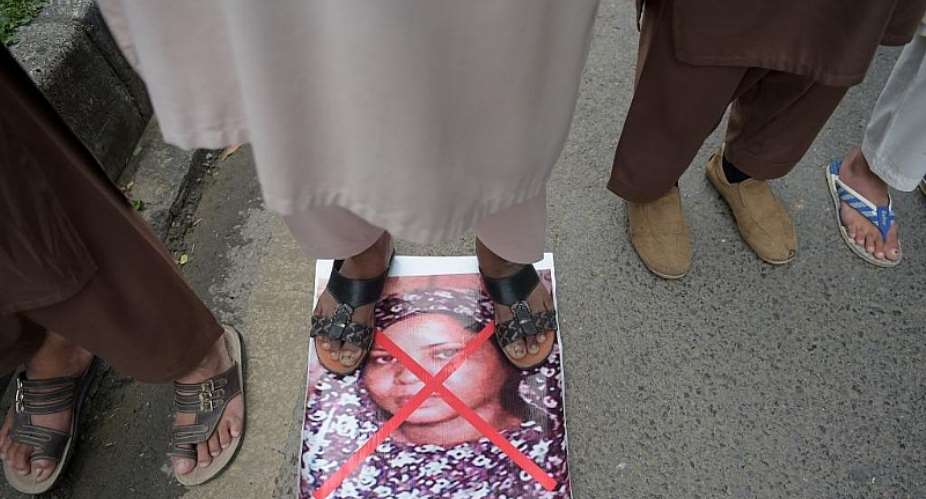The Christian woman at the centre of a decade-long blasphemy row in Pakistan has left the country, months after her death sentence was overturned, sparking mass protests by Islamist hardliners.
Her departure is the latest chapter in a saga that has sparked violent demonstrations and high-profile assassinations while highlight religious extremism across wide sections of Pakistani society.
"Asia Bibi has left Pakistan of her own free will," the government source told the Agence France Presse news agency, speaking on condition of anonymity.
It was not clear when Bibi may have left or where she may have gone. Her lawyer, Saif ul Mulook, said he had not spoken to Bibi directly but understood from "sources" that she was in Canada, where her daughters are believed to have already fled.
There was no immediate announcement from Pakistani officials or the Canadian High Commission in Islamabad.
British Foreign Secretary Jeremy Hunt tweeted his relief that Bibi "appears to have left Pakistan safely", adding: "This shows that with concerted effort the right thing can happen."
Blasphemy carries a maximum death penalty under Pakistan's penal code.
It is an incendiary issue in the Muslim-majority country, and mere allegations of insulting Islam have sparked lynchings and vigilante violence in the past.
"It is a great relief that this shameful ordeal has finally come to an end and Asia Bibi and her family are safe," said Omar Waraich, deputy South Asia director at Amnesty International.
"She should never have been imprisoned in the first place, let alone endure the constant threats to her life. This case horrifyingly illustrates the dangers of Pakistan's blasphemy laws and the urgent need to repeal them."
Violent protests
Bibi – a labourer from central Punjab province – was first convicted of blasphemy in 2010 and was on death row until her acquittal last year.
Her case swiftly became the most infamous in Pakistan, drawing worldwide attention to extremism in the country.
She has technically been free to leave Pakistan since January when the Supreme Court dismissed a legal challenge to her acquittal in October.
Since then, Bibi has been widely believed to have been held in protective custody by authorities as she awaited an asylum deal in a third country.
Many blasphemy cases in Pakistan see Muslims accusing Muslims, but rights activists have warned that religious minorities – particularly Christians – are often caught in the crossfire, with such accusations used to settle personal scores.
Two politicians have been assassinated in connection with Bibi's case, and she spent much of her time in prison in solitary confinement because of fears she could be attacked by a guard or another prisoner.
Islamist groups have regularly called for her to be executed, and activists have warned that she would not be safe in Pakistan.
Following Bibi's acquittal in October the country was gripped for days by violent protests led by hardline group Tehreek-e-Labaik Pakistan (TLP), which also called for mutiny in the armed forces and assassination of the country's top judges for acquitting her.
In the wake of the nationwide protests, TLP's leaders – who paralysed the capital Islamabad for weeks in 2017 with an anti-blasphemy sit-in – were rounded up in a government crackdown months ago and remain in detention.
Christians – who make up around two percent of the population – occupy one of the lowest rungs in class-obsessed Pakistani society, largely living in slums and working menial jobs as street sweepers, cleaners and cooks.





 We’ll protect state wealth from opaque deals – Prof Jane Naana
We’ll protect state wealth from opaque deals – Prof Jane Naana
 Mauritania president says running for second term in June polls
Mauritania president says running for second term in June polls
 I won't ever say I was a mere driver’s mate' — Prof. Opoku-Agyemang
I won't ever say I was a mere driver’s mate' — Prof. Opoku-Agyemang
 2024 polls: 'EC struggling to defend credibility'— Prof. Opoku-Agyemang
2024 polls: 'EC struggling to defend credibility'— Prof. Opoku-Agyemang
 Akufo-Addo gov't's 'greed, unbridled arrogance, unrestrained impunity, sheer dis...
Akufo-Addo gov't's 'greed, unbridled arrogance, unrestrained impunity, sheer dis...
 Election 2024: Ghana needs an urgent reset, a leadership that is inspiring – Ma...
Election 2024: Ghana needs an urgent reset, a leadership that is inspiring – Ma...
 Partner NDC to rollout a future of limitless prospects – Prof Jane Naana Opoku-A...
Partner NDC to rollout a future of limitless prospects – Prof Jane Naana Opoku-A...
 NPP will remain in gov’t till Jesus comes — Diana Asamoah
NPP will remain in gov’t till Jesus comes — Diana Asamoah
 Sunyani Technical University demands apology from former SRC president over sex-...
Sunyani Technical University demands apology from former SRC president over sex-...
 'Dumsor' was resolved by Mahama but ‘incompetent' Akufo-Addo has destroyed the g...
'Dumsor' was resolved by Mahama but ‘incompetent' Akufo-Addo has destroyed the g...
